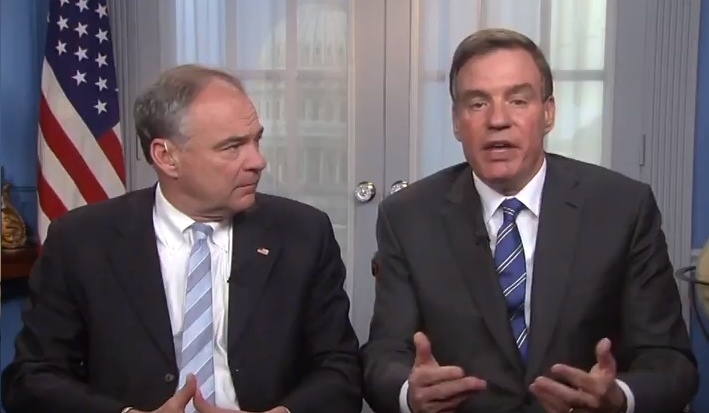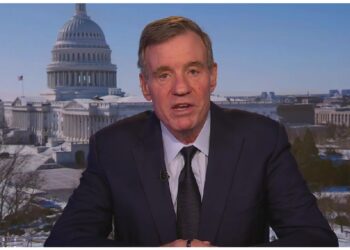Nice job by Senators Mark Warner and Tim Kaine:
WARNER & KAINE SECURE NEARLY $135 MILLION FOR VIRGINIA IN SENATE FY2023 BUDGET BILLS
Funding would support health, safety, and local economies throughout Virginia
WASHINGTON, D.C. —Today, U.S. Senators Mark R. Warner and Tim Kaine announced that they successfully secured nearly $135 million in federal funding for Virginia in pending government funding bills for Fiscal Year 2023, as the latest text of the bills was recently unveiled by the Senate Appropriations Committee. The next step for the legislation is a markup and advancement by the Senate Appropriations Committee, which is expected later this year, followed by Senate floor consideration.
“I’m proud to have worked to secure these investments for communities all throughout Virginia,” said Warner. “By propelling impactful local projects, these dedicated federal dollars will further build on the progress we’ve made through the bipartisan infrastructure law and the many rounds of COVID-19 relief funding authorized by Congress. I look forward to seeing these diverse projects generate jobs, support Virginia’s tourism economy, make neighborhoods safer, and bring communities together.”
“The annual budget is always an important opportunity to fight for Virginia priorities and America’s leadership around the world—and I’m pleased with how that effort is shaping up for the upcoming Fiscal Year,” said Kaine. “I will keep fighting to keep the many critical components of these bills intact as we get this budget across the finish line—from keeping Virginia communities safe from gun violence, COVID, and future health crises; to addressing food insecurity and the root causes of migration.”
As part of last year’s budget process, the Senate revived a process that allows members of Congress to make Congressionally Directed Spending requests, otherwise known as earmarks, in a manner that promotes transparency and accountability. This process allows Congress to dedicate federal funding for specific projects.
Through strong advocacy, the senators secured—and will fight to keep—Congressionally Directed Spending dollars in the funding bills for the following projects in Virginia:
- For projects in Northern Virginia, click here.
- For projects in Central Virginia, click here.
- For projects in Southwest Virginia and Southside, click here.
- For projects in the Shenandoah Valley, click here.
- For projects in Hampton Roads, click here.
- For projects that impact communities in multiple regions across the Commonwealth, click here.
In addition, should they be passed as-is, the budget bills include funding for the following Warner and Kaine priorities:
Boosting Local Economies: Includes $200 million for the Appalachian Regional Commission and $7 million for the Southwest Crescent Regional Commission to support their work to build economic partnerships, create opportunity, and foster economic development.
Strengthening Transportation and Recreation Infrastructure: Provides $150 million for the Washington Metropolitan Area Transit Authority, and $25 million for the Active Transportation Infrastructure Investment Program, which supports multi-purpose trails.
Making Our Communities Safer: Provides $50 million for Community Violence Prevention grants to support communities in developing comprehensive, evidence-based violence intervention and prevention programs, including efforts to address gang and gun violence, based on partnerships between community residents, law enforcement, local government agencies, and other community stakeholders.
Support for Missing Persons Program: Includes $1 million to help with the nationwide implementation of the Ashanti Alert system. In 2018, Warner secured unanimous Senate passage of the Ashanti Alert Act, legislation that created a new federal alert system for missing or endangered adults between the ages of 18-64. The bill was signed into law on December 31, 2018.
Addressing Gun Violence: Provides $100 million for new violence intervention programs to prevent mass casualty or gang-related gun violence. Additionally, provides $60 million—a $30 million increase compared to Fiscal Year 2022—to support research into effective ways to prevent firearm related injuries.
Fighting Hunger: Includes over $2 billion to combat global hunger and malnutrition, following Kaine’s emphasis on the threat Russia’s invasion of Ukraine poses to food security around the world and Warner’s successful efforts to support non-governmental organizations responding to the food crisis.
Fighting COVID: Includes $16 billion in funding for the procurement of additional COVID vaccines and therapeutics and to support the development of next-generation vaccines and therapeutics that could better protect Virginians against new COVID variants.
Addressing Americans’ Long COVID Needs: Includes $15 million for the Agency for Healthcare Research and Quality (AHRQ) to provide the research needed to ensure those experiencing long COVID have access to the patient-centered, coordinated care they need; address disparities in diagnosis and treatment of long COVID; and identify treatments for the condition. Also provides the Centers for Disease Control and Prevention (CDC) with $25 million to continue studying long COVID. Both of these efforts were first outlined in Senator Kaine’s CARE for Long COVID Act.
Supporting Health Care Providers: Includes $30 million to further implement the Dr. Lorna Breen Health Care Provider Act, legislation Kaine wrote and named in honor of Dr. Lorna Breen, a physician from Charlottesville who was working on the front lines of the pandemic in New York and died by suicide in the spring of 2020. The resources will go toward comprehensive and evidence-based support to prevent suicide, burnout, and mental and behavioral health conditions among health care providers. Kaine led a bipartisan push to include this funding in the Fiscal Year 2023 budget.
Addressing the Maternal Mortality Crisis: Includes $496 million—an increase of $304 million above Fiscal Year 2022 funding—for the Maternal Mortality Initiative, following a bipartisan push led by Kaine for funding to prevent maternal deaths, eliminate inequities in maternal health outcomes, and improve maternal health.
Pandemic Preparedness: Includes $10.5 billion in non-emergency funding for global health—a $680 million increase compared to Fiscal Year 2022—and $5 billion to support national COVID vaccination campaigns in countries with low vaccination rates. This funding is critical to protecting Americans from the impacts of disease outbreaks around the world.
Modernizing America’s Health Data Infrastructure: Includes $200 million—an increase of $100 million compared to Fiscal Year 2022—to modernize the public health data systems that help support healthy communities throughout America. Kaine, who pushed for this funding, also crafted the Improving Data Accessibility Through Advancements (DATA) in Public Health Act, legislation to increase timely and accurate information sharing between local, state, and federal public health departments to improve our preparedness and response to emerging public health threats.
Increasing Funding for Pediatric Research: Provides $12.6 million to further fund the Gabriella Miller Kids First Research Act—legislation championed by Warner and Kaine and named after a child from Loudoun County who died from a brain tumor in 2013.
Reducing Tobacco Use: Includes $20 million in funding to support the CDC, states, and territories’ continued efforts to reduce tobacco use among disparate populations and regions with high tobacco prevalence and mortality and to expand the highly successful and cost-effective Tips from Former Smokers media campaign. The investment follows a successful bipartisan push by Kaine to raise the tobacco age from 18 to 21 and a push to ensure that the Food and Drug Administration could regulate synthetic nicotine.
Addressing the Root Causes of Migration: Provides resources for a diverse array of programs to help improve the conditions that drive migration from Central America, including programs focused on counter-narcotics efforts and economic development.
Expanding High-Speed Internet Access: Includes $400 million for the USDA’s ReConnect Program to expand access to high-speed broadband to remote underserved areas. Warner and Kaine have been vocal advocates for expanding broadband. As Governors and Senators, Warner and Kaine have long supported expanding broadband access in Virginia. During the pandemic, they secured significant funding for broadband through the Coronavirus Aid, Relief, and Economic Security (CARES) Act. Warner and Kaine also joined a bipartisan letter to Senate leadership requesting this funding earlier this year. Warner also personally secured billions of dollars for broadband expansion in both the American Rescue Plan and the Infrastructure Investment and Jobs Act.
Increasing Military Pay and Compensation: Includes $1.5 billion to fully fund a 4.6 percent pay raise for servicemembers. Also, includes roughly $1.5 billion in additional funding for compensation to help with rising costs as well as $373 million towards a number of military family support programs. Warner, who pushed for this funding, has long stressed the need for increased support for servicemembers through legislation such as the Military Hunger Prevention Act that helps low-income military families put food on the table.
Economic Support for Underserved Communities: Provides $324 million for the U.S. Department of the Treasury Community Development Financial Institution Fund. Warner, who requested this funding, has led efforts in Congress to support CDFIs through legislation including the Jobs and Neighborhood Investment Act and the creation of the bipartisan Senate Community Development Finance Caucus.
Addressing Internal Revenue Service (IRS) Delays and Customer Service Issues: Incudes $310 Million for the IRS, which will enable IRS to continue to update ancient computer systems, improve customer service, and reduce wait times for refunds and other services. Warner and Kaine have consistently pushed the IRS to address poor customer service and severe delays within the department.
Support for Miners: Includes $11.845 million for Black Lung Clinics. Warner and Kaine have actively worked to secure benefits for miners and their families suffering from black lung disease. In August, the Inflation Reduction Act, supported by both Warner and Kaine, permanently extended the Black Lung Disability Trust Fund excise tax at a higher rate, providing more certainty for miners, miner retirees, and their families who rely on the fund to access benefits.
In addition to battling for these priorities, the Senators will work to ensure that funds obtained by Virginia House members also remain in the ultimate budget package.


















